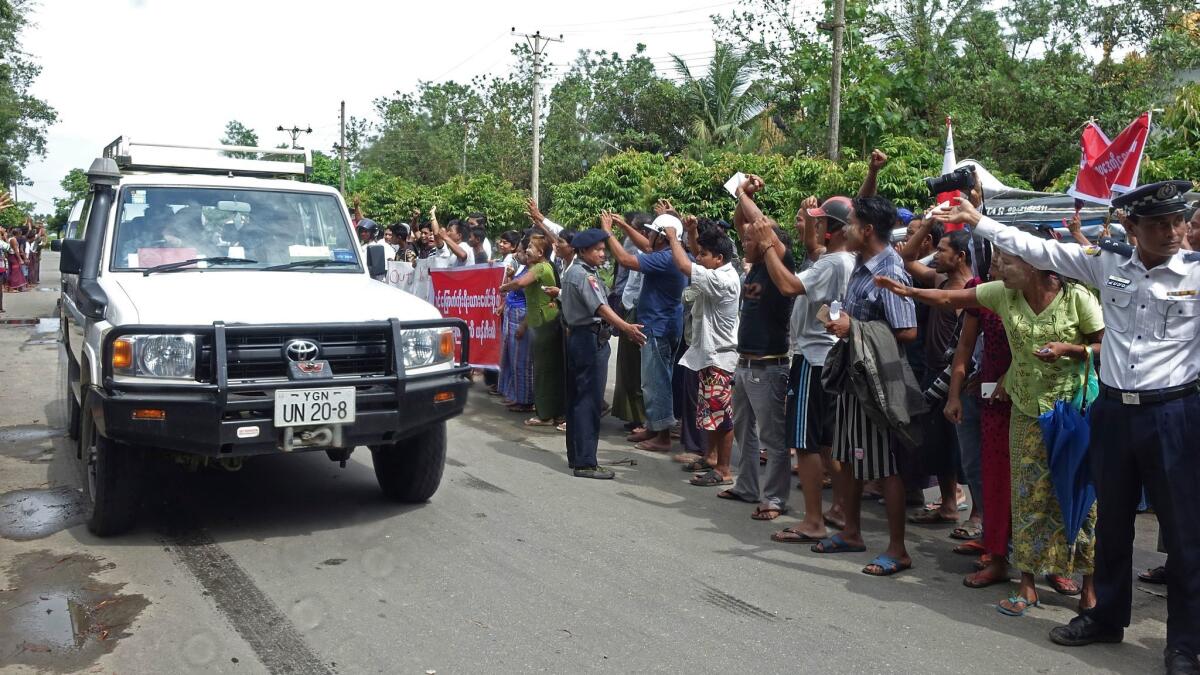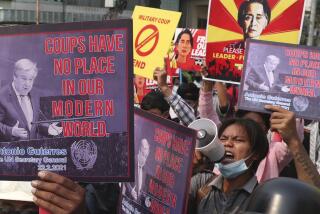Editorial: If Myanmar really wants to be considered a democracy, it needs to let in the U.N. fact-finding mission

- Share via
Aung San Suu Kyi may have won international acclaim as an advocate for human rights and democracy in her native Myanmar, but since becoming the country’s de facto leader 15 months ago, she has done little to protect the human rights of the stateless Rohingya Muslim minority there. Long a target of persecution, the country’s estimated 1 million Rohingya live mostly in the Rakhine state in impoverished villages. About 120,000 of them have ended up in wretched displaced persons camps.
Now, in another alarming move, Suu Kyi’s government has refused to allow a U.N. fact-finding team to come into the country to investigate reports of human rights abuses by security forces in Rakhine against the Rohingya. The decision to deny visas to members of the mission, established by the U.N.’s Human Rights Council earlier this year, seems more in step with the repressive military regime that Myanmar used to be than the fledgling democracy it now prides itself on being. Suu Kyi and her government should immediately reverse course and let the U.N. human rights mission into the country to investigate.
The latest wave of violence started last fall after armed men, believed to be connected to a militant Rohyinga group, attacked border guard outposts on Oct. 9, killing nine police officers. In response, the Myanmar government instituted a massive crackdown in the area that included hundreds of arrests. Police officers and soldiers allegedly conducted a months-long campaign of terror, according to reports gathered by human rights groups and the United Nations, indiscriminately killing hundreds, raping and abusing women and children and burning down homes. As many as 90,000 Rohingya have fled their villages since last fall. Investigating all this is the goal of the fact-finding mission.
Human Rights Watch, an international advocacy group, has decried Myanmar’s refusal to grant visas. Even the Trump administration, so reticent to wade into human rights controversies that might cause political fallout, has called on the government of Myanmar — also known as Burma — to cooperate with the United Nations. “The international community cannot overlook what is happening in Burma,” said Nikki Haley, the U.S. Ambassador to the United Nations.
Suu Kyi and other government officials have dismissed the U.N. request, saying the government is doing its own investigation. Suu Kyi has steadfastly tried not to alienate those in the Buddhist-majority country who maintain that the Rohingya are in the country illegally. She has said that allowing in the U.N. team will only heighten tensions in Rakhine.
Actually, one sure way to raise tensions is for Myanmar to continue treating the Rohingya so badly (denying them access to healthcare and education as well as citizenship) that more of them become radicalized. In the last week, the government has opened Rakhine to a group of foreign journalists (with government escorts) and a human rights investigator for the United Nations (who is reportedly not touring all of Rakhine.) That’s good, but that’s not enough. The government of Myanmar needs to allow the full U.N. fact-finding mission unfettered access to Rakhine to show that it has changed not only its leaders, but the way they govern as well.
Follow the Opinion section on Twitter @latimesopinion and Facebook.
More to Read
A cure for the common opinion
Get thought-provoking perspectives with our weekly newsletter.
You may occasionally receive promotional content from the Los Angeles Times.






